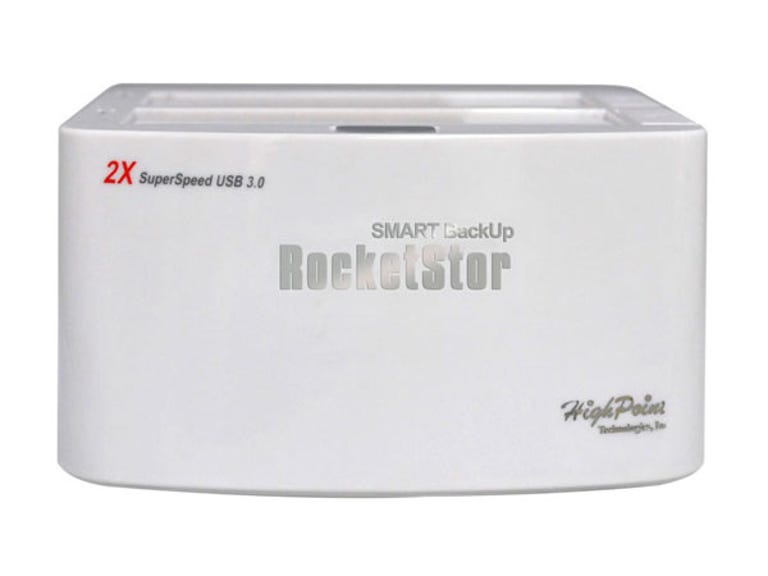 Why You Can Trust CNET
Why You Can Trust CNET HighPoint RocketStor 5122B review: HighPoint RocketStor 5122B
HighPoint's RocketStor is a decent USB 3.0 dock, it's major draw being that it services each slot with its own USB 3.0 connection, rather than sharing bandwidth. If throughput is your concern, give this one a look.
Editor's note: this review has been updated. While we originally believed there to be an incompatibility between the RocketStor and HighPoint's RocketU 1144A, this is not the case; rather, the incompatibility lies between specific hard drives and the RocketU 1144A.
The Good
The Bad
The Bottom Line
HighPoint doesn't do USB 3.0 by halves. When most vendors will happily do multiport USB 3.0 adapters but share all ports across a single controller chip, thereby reducing maximum simultaneous speed, HighPoint instead adds a single controller chip per port to squeeze the most out of the interface.
The same thinking goes in to its RocketStor, a 3.5- and 2.5-inch SATA to USB 3.0 dock. There are two bays, but each is fed by a dedicated USB 3.0 cable. Both of these cables are joined together into a single entity that's only about 1 metre long — so it won't necessarily suit all set-ups.
The unit itself is white-gloss plastic, and it looks and feels a little cheap. There's an eject button on the right-hand side that pushes drives up to help with release, although realistically you can just pull the drive right out. A "Snap Backup" button is on the top, which works in tandem with HighPoint's included software to automate backups. Interestingly, the software is run via a local web server on Apache, rather than providing native code.
The layout is incredibly confusing, and just to assign a backup task to the button on the device is a chore. Incremental backups can be performed, and are each stored as a compressed file with an index rather than just a straight copy, under the folder ".RocketStor". The latter isn't great — as a dot folder, it'll be hidden under OS X and Linux, which may make some neophyte users believe a drive is empty when it's not. You'll need to use HighPoint's software to recover whatever you may back up.
The RocketStor's box recommends using it in concert with HighPoint's own RocketU 1144A USB adapter for "maximum performance", as each USB 3.0 port is guaranteed full performance rather than sharing bandwidth — so we did.
It should be noted that we ran into some incompatibility issues here. Specifically, Western Digital's 3TB Red Drive and 1TB Raptor caused issues in Disk Management, and wouldn't format when connected to the RocketU. Although we originally believed this to be an incompatibility between dock and controller, with HighPoint's assistance and verifying by testing another USB dock, we were able to determine that the incompatibility was between the hard drives and the RocketU. When connected to Intel or Via USB 3.0 ports, the drives functioned as expected.
Plugging in a 256GB Intel 520 SSD, we used CrystalDiskMark to compare speeds across Intel, Via and HighPoint RocketU USB 3.0 ports, and also included SATA 6Gbps.
| Intel 520 SSD 256GB (RocketU USB 3.0) | Intel 520 SSD 256GB (Intel USB 3.0) | Intel 520 SSD 256GB (Via USB 3.0) | Intel 520 SSD 256GB (SATA 6Gbps) | |
|---|---|---|---|---|
| Sequential read | 223.6 | 245.9 | 222.8 | 475.4 |
| Sequential write | 240.9 | 233.5 | 182.3 | 246.9 |
| 4k random read | 18.91 | 20.32 | 20.54 | 28.99 |
| 4k random write | 39.54 | 47.31 | 30.16 | 86.79 |
| 4k QD32 random read | 20.15 | 21.06 | 21.65 | 231.0 |
| 4k QD32 random write | 66.41 | 52.96 | 36.71 | 128.7 |
All USB 3.0 implementations are not created equal, with Via in particular suffering some significant losses. Most interesting are the QD32 tests, with the SATA 6Gbps connection flooring the USB 3.0.
HighPoint's RocketStor is a decent USB 3.0 dock, it's major draw being that it services each slot with its own USB 3.0 connection, rather than sharing bandwidth. If throughput is your concern, give this one a look.


